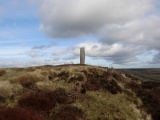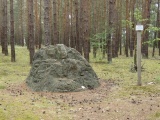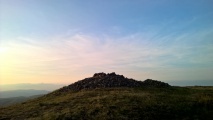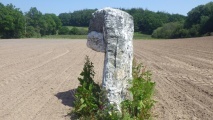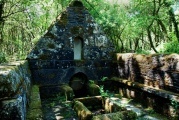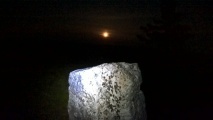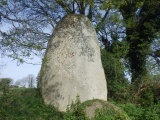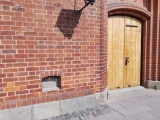Andy Burnham's Blog, page 20
June 16, 2025
Blakey Howe (Farndale Moor)
A bronze age round barrow with an 18th century boundary stone on top, this may be a reused prehistoric standing stone. There is also a 1.5m deep, 6m wide depression in the top caused by excavation that is said to have been later used for cockfighting, hence its alternative name of Cockpit Howe. The letters TD are engraved on the boundary stone, standing for Thomas Duncombe, 18th century Lord of the Manor of Helmsley and owner of the Duncombe Estate.
Published on June 16, 2025 10:13
June 15, 2025
Opferstein Muckwar
A legendary erratic boulder with furrows and depressions - possibly some are human made. "Opferstein" means sacrificial stone. The stone is situated in the forest 1km south of Muckwar, Brandenburg on a hiking trail.
Published on June 15, 2025 08:24
Pen Pumlumon-Arwystli
A really long walk no matter which way you come from - a long uncomfortable slog of a walk.
But the view is really quite splendid (for mid Wales).
And the three cairns are really very good. More photos and info on our page.
But the view is really quite splendid (for mid Wales).
And the three cairns are really very good. More photos and info on our page.
Published on June 15, 2025 08:20
June 14, 2025
Menhir de la Chapelle Saint-Gildas
At the rear of a chapel in Côtes-D'Armor, Bretagne is this menhir with veins of quartz, 1.95 metres tall. It stands solitary in a field with a strange lump on one side. You can visit St Gildas' Well at the same time (see previous post), as you park for the holy well and follow the footpath to the chapel.
Published on June 14, 2025 13:00
St Gildas Well (Laniscat)
This is one of many holy wells dedicated to St Gildas - the healing of rabies seems to be one of their attributes. Every year, on 30th January after Mass, dogs are taken to this fountain to receive blessings and food.
Published on June 14, 2025 06:19
Carreg Wen (Hafren)
HarryTwenty has shared his photos of the major lunar standstill moonrise over Carreg Wen, June 11 2025: "The likely link between quartz and the moon in prehistoric times has been pointed out so the lunar standstill here is pretty special". A quartzite standing stone, probably Bronze Age. About 1.6km (1 mile) SE of the source of the River Severn. There was once a forest here which may be marked as Hafren Forest on the OS map but the area near the stone has been cleared .
Published on June 14, 2025 06:18
June 12, 2025
Out Soon: Stone Lands by Fiona Robertson, Launch Events inc. 24th June, Avebury
Out on the 16th June - the amazing new book Stone Lands by Fiona Robertson who was executive Editor on The Old Stones. I think it's fair to say our book wouldn't have happened without her drive, knowledge and enthusiasm and Fiona has come up with something extraordinary again here. To me Prof. Josh Pollard sums up Stone Lands best: ‘Written with great craft, sensitivity and authority, Fiona Robertson offers a wonderfully evocative, and at times deeply personal and poignant, account of the ancient sites and landscapes of Britain.'
Published on June 12, 2025 23:52
June 11, 2025
Menhir de Cosquer Jehan
At the hamlet of Cosquer Jehan, 4.5km northwest of the village of Kérien, can be found this bulky, 5.5 metre tall coarse granite menhir, in a hedgerow just to the north of the D69 road. There are many other large stones around it, one of which is 15m in length with 8m below the ground.
Published on June 11, 2025 12:28
June 10, 2025
Ancient stone in Vor Frue church, Svendborg
A Bronze Age stone with cup-shaped pitting is located in the west facade of the tower of this Danish church, During the 1884 restoration, the stone could not be removed due to concerns for the tower's stability. When the facade was moved forward, the stone was almost hidden, so a hole was created to keep it visible. Initially, the stone was believed lost, prompting a search that yielded no results. Later, a showcase was placed over the hole, leading to the stone's existence being forgotten
until its rediscovery in 2004, making it visible once more.
until its rediscovery in 2004, making it visible once more.
Published on June 10, 2025 09:58
June 9, 2025
St Gwyndaf Stones
Seven ancient carved stones lie in and around the 8th century church of Llanwnda, which is overlooked by the Garn Wnda burial chamber. Five 7th-9th century inscribed stones can be found in the outer walls of the church, with a sixth decorated cross base lying in the undergrowth to the north-west. The most striking stone is decorated with a face.
Published on June 09, 2025 15:06

